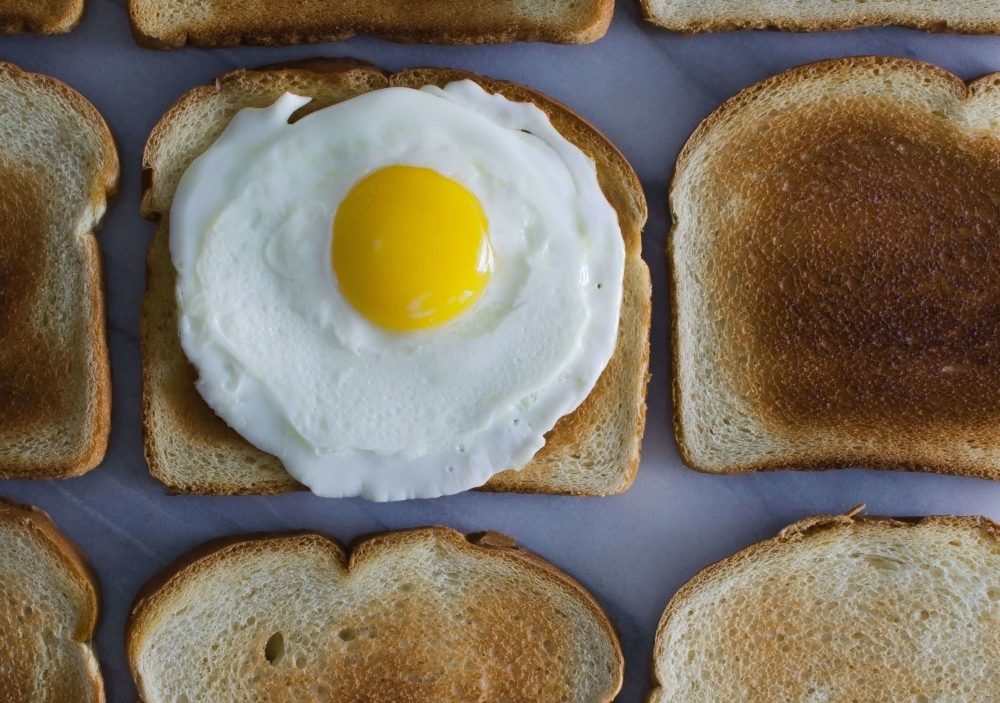Go for gold with your toast
In 2017, Australian real estate mogul Tim Gurner caused somewhat of a stir when he advised millennials to solve their housing woes by putting their ‘$22 a pop’ avocado toast toward a deposit instead. Now, research by University of Texas academics has put forward another reason to ditch toast – avocado or otherwise – as it exposes you to more harmful air pollution than standing at a busy road junction.
As part of the one month study, University of Texas academics built a 1,200-square foot replica of a typical three-bedroom home equipped with dozens of monitors assessing the change in air quality during everyday cooking and cleaning tasks. The researchers found that roasting, frying, and using a gas hob all combined to release a surge of harmful PM2.5 particles into the air.
What exactly are toxic PM2.5s and why should we be concerned? Essentially, these are particles that are smaller than 25 micrometres across. Owing to their size – or lack thereof – they can be inhaled deep into the lungs where they exacerbate respiratory disorders and cardiovascular disease. These small particles are also capable of spreading from the lungs into the bloodstream where they can translocate to and build up in the liver, heart and even the brain – where it is thought they may contribute to depression and other mental health issues.
The researchers found that roasting, frying, and using a gas hob all combined to release a surge of harmful PM2.5 particles into the air
Arguably the most shocking discovery was the impact of toasters. The World Health Organisation (WHO) stipulates that air should contain no more than 25 micrograms of fine particulates per cubic metre. However, when toast was allowed to burn, the particle levels rocketed to as much as 4,000 micrograms of PM2.5s per cubic metre – roughly 150 times the WHO limit. The scientists also revealed that the healthiest way to make toast is to “go for gold” which releases between 300 and 400 micrograms per cubic meter.
Speaking at the American Association for the Advancement of Science meeting in Washington DC, Marina Vance, an assistant professor at the University of Colorado Boulder, stated: “When you make toast, the heating element starts warming up the debris and gunk in the toaster which includes oils.”
Commenting on the early results of the research, Vance added: “Add to that the bread itself – it’s going to emit a range of things. We found ethanol, a by-product of yeast. If there’s tiny pieces of bread touching the heating element you can see the smoke, maybe from crumbs at the bottom of the toaster – they will all make a lot of particles… It led to what would be considered ‘very unhealthy’ air pollution levels if compared to outdoor air quality standards.”
This is a sentiment shared by Jonathan Grigg, a professor who chairs a committee set up by the Royal College of Paediatrics and Child Health which is investigating indoor air pollution, who said: “This research could be a wake-up call to the risks posed by toasting and toasters.”
When you make toast, the heating element starts warming up the debris and gunk in the toaster which includes oils
Furthermore, researchers at the annual meeting in Washington also highlighted the risks of indoor pollution from home furnishings, and household products such as bleach, window sprays and paint. This was of particular concern because, unlike outdoor pollution, which is regulated, indoor pollution is not, even though figures released by the US Environmental Protection Agency indicate the people spend as much as 90% of their time indoors.
It is the view of Joost de Gouw that, “as with any pollution there will be more susceptible groups such as the young and elderly… What’s clear is people spend a lot of time indoors and they are exposed in some cases to much higher levels than what you see outdoors.”
So, is there anything we can do to remove this invisible pollution? Vance advises people to open windows and use kitchen extractors, although was hesitant to suggest the use of fans – which serve only to recirculate air without adequately filtering it. “The joke we’ve been telling each other is boil everything, avoid roasting, but it’s too delicious,” she added.

Comments